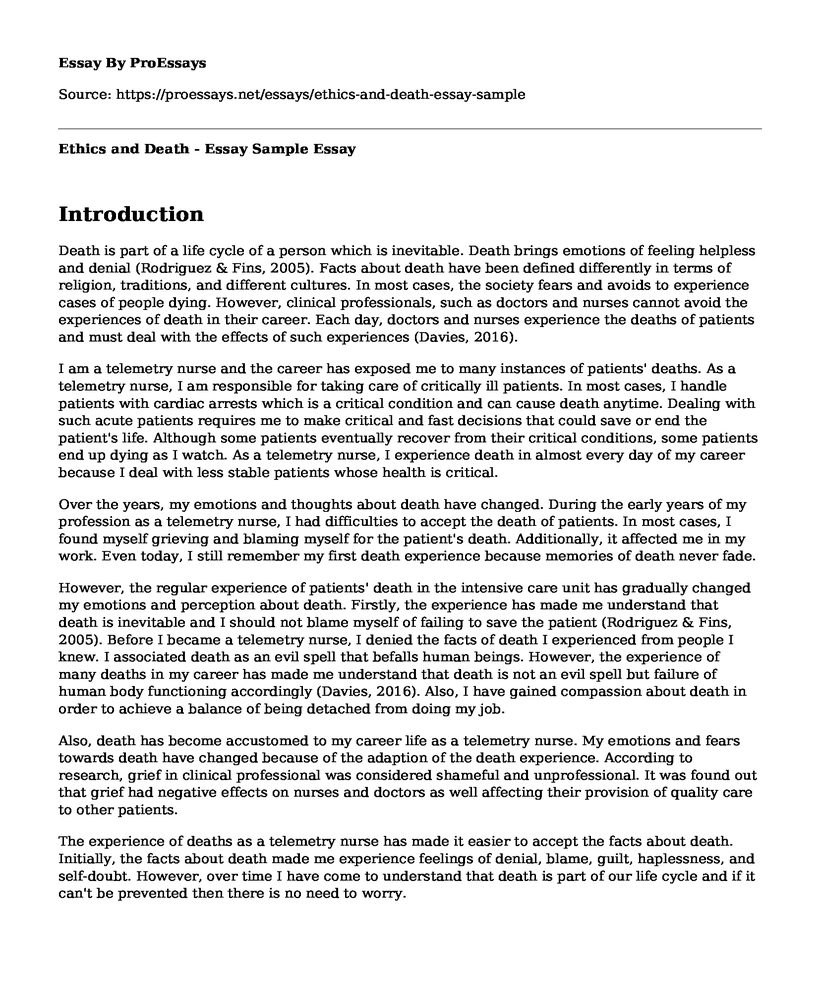Introduction
Death is part of a life cycle of a person which is inevitable. Death brings emotions of feeling helpless and denial (Rodriguez & Fins, 2005). Facts about death have been defined differently in terms of religion, traditions, and different cultures. In most cases, the society fears and avoids to experience cases of people dying. However, clinical professionals, such as doctors and nurses cannot avoid the experiences of death in their career. Each day, doctors and nurses experience the deaths of patients and must deal with the effects of such experiences (Davies, 2016).
I am a telemetry nurse and the career has exposed me to many instances of patients' deaths. As a telemetry nurse, I am responsible for taking care of critically ill patients. In most cases, I handle patients with cardiac arrests which is a critical condition and can cause death anytime. Dealing with such acute patients requires me to make critical and fast decisions that could save or end the patient's life. Although some patients eventually recover from their critical conditions, some patients end up dying as I watch. As a telemetry nurse, I experience death in almost every day of my career because I deal with less stable patients whose health is critical.
Over the years, my emotions and thoughts about death have changed. During the early years of my profession as a telemetry nurse, I had difficulties to accept the death of patients. In most cases, I found myself grieving and blaming myself for the patient's death. Additionally, it affected me in my work. Even today, I still remember my first death experience because memories of death never fade.
However, the regular experience of patients' death in the intensive care unit has gradually changed my emotions and perception about death. Firstly, the experience has made me understand that death is inevitable and I should not blame myself of failing to save the patient (Rodriguez & Fins, 2005). Before I became a telemetry nurse, I denied the facts of death I experienced from people I knew. I associated death as an evil spell that befalls human beings. However, the experience of many deaths in my career has made me understand that death is not an evil spell but failure of human body functioning accordingly (Davies, 2016). Also, I have gained compassion about death in order to achieve a balance of being detached from doing my job.
Also, death has become accustomed to my career life as a telemetry nurse. My emotions and fears towards death have changed because of the adaption of the death experience. According to research, grief in clinical professional was considered shameful and unprofessional. It was found out that grief had negative effects on nurses and doctors as well affecting their provision of quality care to other patients.
The experience of deaths as a telemetry nurse has made it easier to accept the facts about death. Initially, the facts about death made me experience feelings of denial, blame, guilt, haplessness, and self-doubt. However, over time I have come to understand that death is part of our life cycle and if it can't be prevented then there is no need to worry.
Conclusion
In conclusion, death can be emotional especially losing our loved ones. However, as a clinical professional, one experience death on regular basis. The experience of patients' dying is painful but healthcare professionals have understood that death is inevitable and no reasons for self-guilt. I don't say I embrace death, but throughout my career, I have gradually changed my mind about facts of death.
References
Davies, M. (2016). Death is part of a doctor's job. BMJ, i5597. doi: 10.1136/bmj.i5597
Rodriguez del Pozo, P., & Fins, J. (2005). Death, dying and informatics: misrepresenting religion on MedLine. BMC Medical Ethics, 6(1). doi: 10.1186/1472-6939-6-6
Cite this page
Ethics and Death - Essay Sample. (2022, Nov 20). Retrieved from https://proessays.net/essays/ethics-and-death-essay-sample
If you are the original author of this essay and no longer wish to have it published on the ProEssays website, please click below to request its removal:
- Essay on Social Work and Social Research Practices
- Should Assisted Suicide Be Allowed?
- Undocumented Immigration and Healthcare Essay
- Terra Sylva School
- Essay Sample on Pancreas and Diabetes: Progenitor Cells & Insulin Secretion
- Essay on Lincoln Hospital: Creative Solutions Needed to Avoid Life-Threatening Conditions
- Neurological Disorders: Alzheimer, Epilepsy, Parkinson's, Brain Tumors, Stroke, Migraine +more - Essay Sample







